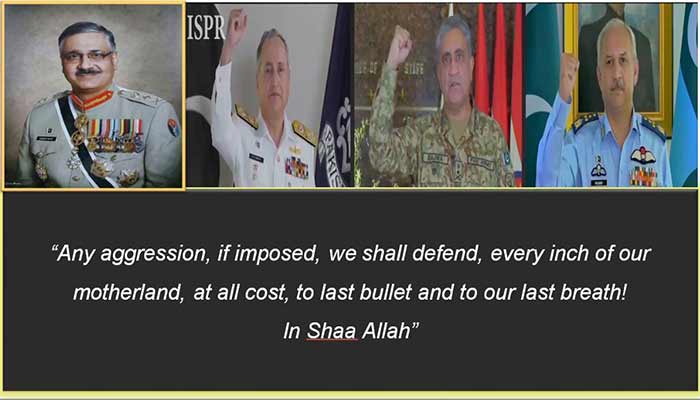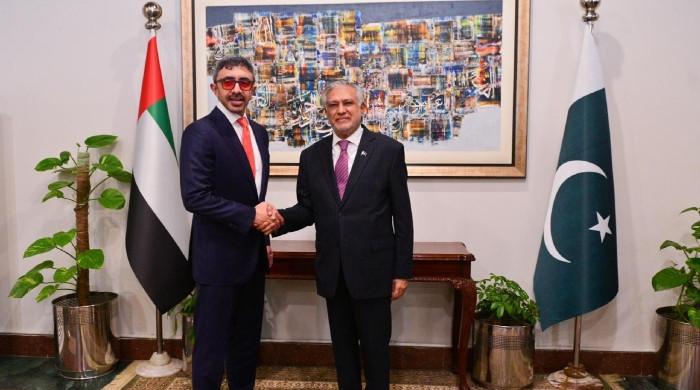Don’t mess with Pakistan, DG ISPR warns India
'We are not getting ready for war but our defence is our right,' Maj Gen Asif Ghafoor said
February 22, 2019
RAWALPINDI: Director General of the Pakistan Army's media wing, Inter-Services Public Relations (ISPR), Major General Asif Ghafoor on Friday warned India to not mess with Pakistan.
Addressing a press conference, DG ISPR refuted reports regarding Pakistan preparing for war and said, "Pakistan is not preparing for war. Threats and reports of a war are coming from your side. We are only using our right to self defence."
“We do not wish to go into war but please be rest assured should you [India] initiate any aggression, first you shall never be able to surprise us. Pakistan armed forces shall never be surprised by you, but let me assure you, we will surprise you. We should also because you initiate, we shall also dominate the escalation ladder. We shall have superior force ratio at decisive point. Never think that due to our commitments elsewhere we will have any capacity lack. We have singleness of conception, from the prime minister down to a citizen, from three chiefs down to a soldier. All political parties all segments of life, 207 million Pakistanis, we have singleness of conception,” the DG ISPR warned as he addressed Indian leadership's threats of waging war on Pakistan.
“We can respond to full spectrum threat. And I hope you get us and don’t mess with Pakistan," Major General Ghafoor asserted.
The DG ISPR explained, "On February 14, a Kashmiri youngster targeted Indian security forces. After the incident, India starting bombarding Pakistan with allegations without any thought or proof. Pakistan took time to respond. We wanted to investigate the allegations and when we were sure footed, the prime minister of Pakistan responded."
"The prime minister made an offer to India which has never been made before. The premier offered to probe the India if actionable evidence is shared," he maintained. "We hope India will wisely consider Pakistan's offer for peace."

Major General Ghafoor continued, "64% of our population is youth and we are in a fifth generation warfare, so their target is the youth of Pakistan. We have a 72 year history. In 1947, Pakistan obtained independence and this is something India has not been able to accept till date. In 1965, tensions emerged at the LoC and our country which was progressing was affected. Then in 1971, our distance from East Pakistan was exploited, however, we were able to get through that as well because of our resilience. From 1971 to 1984, there were no incidents on our eastern border and we began progressing again. But then one day, the Siachen incident happened when the Pakistan Army wasn't there.”
"Then India moved towards nuclear weapons and in 1998, we obtained nuclear power. Then in 2008 we were fighting a decisive war against militants and emerging successful so India started to mobilise its troops on the border," he added.
"Whenever the situation improves in Pakistan, India tries to destabilise the country," the head of the military's media wing asserted. "In February, when the Pulwama attack happened there were eight important events in Pakistan — Saudi crown prince's visit, Afghan reconciliation process, UNSC talking about terror listing, EU deliberating on human rights violations in occupied Kashmir, Kulbhushan Jadhav hearing, FATF hearing and decision on Pakistan, PSL and Kartarpur meeting. The elections are upcoming in India and the indigenous struggle in occupied Kashmir is high."
“How would Pakistan benefit from Pulwama attack in light of these events? Pakistan would be at a loss,” the head of the military's media wing stressed.
Major General Ghafoor continued, "The attack took place miles away from the Line of Control (LoC) and the explosives used were not from Pakistan. The car used was not from Pakistan either. The attack was carried out by a youngster from occupied Kashmir who was mistreated by Indian security forces."
“People in Indian media and social media had predicted an attack like this prior to the elections.”
Questioning whether Pakistan is in diplomatic isolation, DG ISPR said, "You have seen how the heads and delegations of foreign countries are visiting."
'Lt Gen (r) Asad Durrani violated military code of conduct'
Speaking about former chief of the Inter-Services Intelligence (ISI) Lieutenant General (retd) Asad Durrani, DG ISPR said, "He has been found guilty of violating the military code of conduct. His pension and other benefits have been stopped."
"Two senior military officials are under arrest for espionage. They are not part of a network and the army chief has ordered their court martial," he further said.
Pakistan and neighbouring India face heightened tensions after an attack in Pulwama in occupied Kashmir (IoK). New Delhi has blamed Islamabad for the attack which claimed the lives of over 40 paramilitaries. The Pakistani leadership has strongly denied the allegations.
On Thursday, Prime Minister Imran Khan directed the Pakistan Army to respond "decisively and comprehensively" to any aggression or misadventure by India. The premier issued the directives during a meeting of the National Security Council (NSC), which discussed the geo-strategic environment in the region as well as the situation arising after the Pulwama incident.
Prior to the NSC meeting, PM Imran also held a meeting with Army Chief Gen Qamar Javed Bajwa. Sources said the two figures discussed the country and region’s security situation.
Some 44 Indian paramilitary personnel were killed when an explosives-packed van rammed into a convoy transporting 2,500 security forces in the district, in the deadliest attack in the valley in 30 years.
Fencing of Pak-Iran border
Asked about the recent statement by an Iranian military commander, the DG ISPR said, "These are two different contexts, you cannot compare India with Iran. With India we have a history of 70 years I just told you and Iran is a brotherly Muslim neighbour country, with which we have a history of brotherly relations."
He said: "You know we have 2611 km western border with Afghanistan and now we are fencing it. You know there are terrorists there. The arrangement there, be it of forces or the fence, is not for the Afghanistan forces or people, it is for the terrorists.
"Similarly, we share 909 km border with Iran. That border is also unmanned because we are friendly states and we do not have any threat from there, while on that side of the border, the security arrangements are not that exemplary as well. But when terrorists, who traverse from Afghanistan through Iran into Pakistan and vice versa, now we have quite an improved coordination among Pakistan, Afghanistan and Iran so that we do not let our borders be freely used by terrorists.
"But because our focus was more towards Pak-Afghan border, so some terrorists are occasionally active on Pak-Iran border as well, but we have very good coordination with Iran in that regard, you remember the army chief also went there," Maj Gen Ghafoor said.
"We are discussing with Iran to fence the Pak-Iran border also having agreed to each other, so that that border is not used by a third party to exploit against Iran or Pakistan."
He maintained that Pakistan has cordial ties with Iran, which would improve further.
Response to Haqqani's accusations
Questioned about ex-Pakistan ambassador Hussain Haqqani's statement alleging Pakistan having safe havens for terrorists, the DG ISPR replied, "Please request him to come to Pakistan, go with me and indicate to me [those safe havens]."
Kulbhushan Jadhav case
Asked about the impact on Jadhav's mercy plea pending with the army chief in case of a verdict against Pakistan in the case, Maj Gen Ghafoor said
"One that case in sub-judice and I do not want to comment on that. We went to the ICJ, we could have avoided it, but that is also an evidence of being a responsible state that you fulfill international obligations."
He added, "Let the decision come and then we will talk about this."











